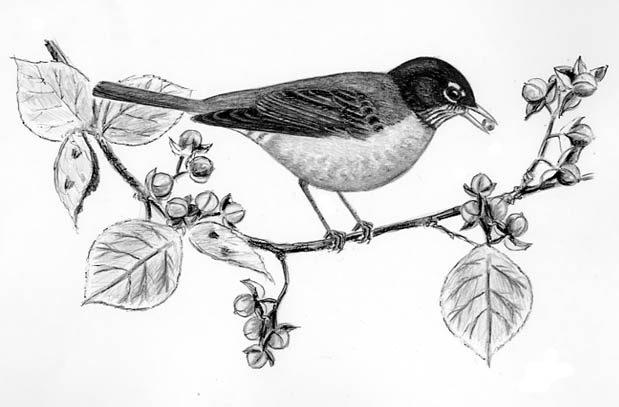
Dear Bird Folks,
My husband wants to remove all of the bittersweet that grows in our yard. He claims that it’s a nuisance plant. I’ve been trying to convince him to leave it alone. Its colorful berries not only brighten up our yard, but I think they are an important source of food for the birds. Do you agree?
– Betsy, Cranston, RI
Before, Betsy,
Before I attempt to intervene between you and your husband in this intense domestic squabble, there is something I need to be clear about. I’m not a plantologist. A brick probably knows more about plants than I do. I don’t enjoy houseplants or work in the flowerbed in the yard. I certainly don’t want a lawn or pull the weeds that grow where a lawn used to be. The only thing I do with plants is eat them. That’s my way of getting back at them for what poison ivy has done to me. Stupid poison ivy. Why doesn’t your husband do something about that?
Here’s what I know about bittersweet. There are two species of it found in eastern North America. One species is good and you probably should encourage it to grow. But the good bittersweet, like many things in life, has an evil twin. This bad bittersweet looks a lot like the good bittersweet; only it grows out of control and kills or displaces everything in its path. Here is one more piece of information. The evil bittersweet twin was introduced from overseas. Are you surprised? No? I didn’t think so.
Even though the two bittersweets are very similar, some bonehead still wanted an imported one and now we are stuck with it. Oriental Bittersweet first arrived back in 1860, which, contrary to what many of you think, was before my time. However, I’ve heard that it was brought to this country as an ornamental plant. Like you, Betsy, people love the way its colorful berries brighten up their yards during the gray days of winter. And because it grows so quickly, it became a favorite plant of florists who used the berry-filled vines for wreathes and other arrangements. Unfortunately, once the florists’ customers grew tired of their arrangements they simply tossed them out and thus helped spread the seeds. Those wicked florists. You really can’t trust any group of people who spend their entire lives touching flowers.
Florists aren’t the only ones to blame here. When our old pals the birds eat bittersweet berries they eventually pass the berries through their digestive system. The seeds and other indigestible parts are then eliminated from the birds in the form of…well, you know. Whatever seed-filled droppings don’t land on the windshield of my car, hit the ground and have a good chance of germinating and becoming a new, colorful patch of bittersweet.
This brings us back to the last part of the debate you are having with your husband. If bittersweet, imported or otherwise, is beneficial to birds, shouldn’t we encourage it and not remove it? Well, the first thing you should do is take a cutting of the plant in question to a nearby garden center to determine if you have the innocuous native bittersweet. If it is the American Bittersweet, then just leave it alone. It grows slowly and does little harm to the plants around it. However, the odds are that you will be dealing with the Oriental Bittersweet since that has become far more common in recent years. And if it is the imported one I say give it the old heave-ho. Even though some birds do eat its berries, they are not their favorite. The birds would probably benefit more from trees and shrubs that will eventually be displaced by the aggressive vine.
All in all, I’m going to have to side with your husband on this one, Betsy. The imported bittersweet probably does more harm than good. Tell him to go rip it out. Don’t feel bad losing the argument, though. Not only will your husband be getting rid of an invasive plant, but also he’ll be out of your hair for at least a weekend or two. It’s a win-win.
On another topic:
A woman by the name of Priscilla, from Caswell,ME, wrote me a note asking if pumpkin seeds were safe for birds and why don’t we see them for sale as bird food. She also wanted the answer to be as long as possible. Well, sorry, Priscilla. Even I can’t drag out an answer about pumpkin seeds. However, they are fine for birds to eat. The major reason why we don’t see them for sale as bird food is the price. I’ve seen them as high as three and four dollars a pound. Whoa! Sunflower seeds are still cheaper and better. Pumpkin seeds are often sold in mixes for caged birds. Pet bird people are like dog people. The more they spend, the happier they are.
As long as the price stays high, Priscilla, you probably won’t see many pumpkin seeds for sale for wild birds. Although the way sunflower keeps going up pumpkin seeds may be the wave of the future.